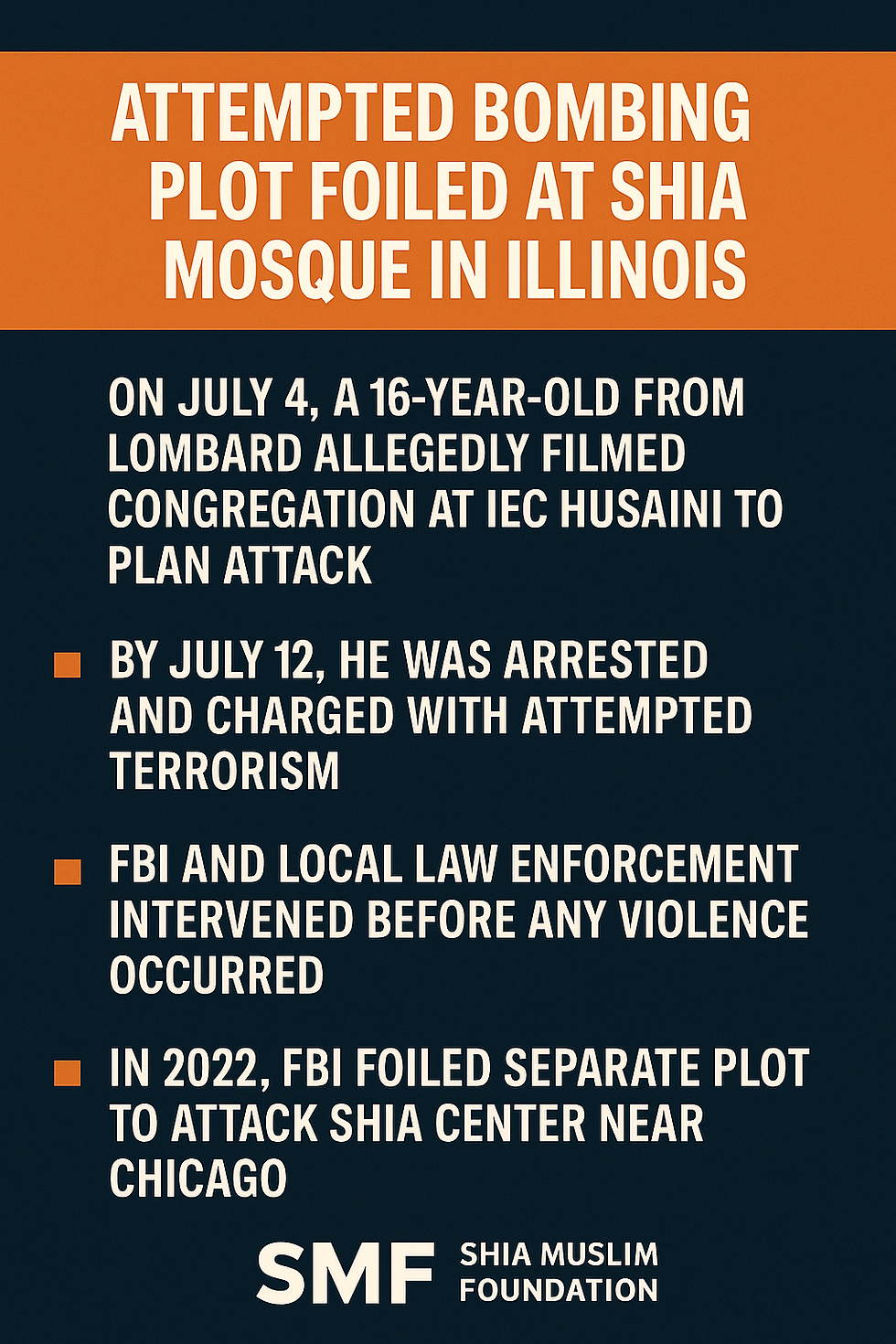- SMF

- Jul 18, 2025
- 3 min read

July 18, 2025
Attempted Bombing Plot Foiled at Shia Mosque in Illinois: SMF Calls for Urgent Action
Washington, DC – The Shia Muslim Foundation (SMF) is sounding the alarm following the arrest of a 16-year-old from Lombard, Illinois, charged with plotting a terrorist attack against IEC Husaini, a prominent Shia mosque in Glendale Heights. The FBI and local law enforcement prevented what could have been a mass-casualty event during religious services at the center.
According to law enforcement, the teenager entered IEC Husaini on July 4 during active worship, filming the building’s layout and congregation—allegedly for the purpose of planning an explosive attack. He was later found in possession of a concealed firearm. Investigators uncovered evidence that he intended to use the footage and weapons to carry out a deadly assault. He is now in custody facing felony charges including attempted terrorism.
“This wasn’t a hate crime gone too far. This was a deliberate, premeditated attempt to massacre American Muslims during worship,” said Rahat Husain, Executive Director of the Shia Muslim Foundation. “Without rapid intervention from the FBI and state officials, we could be mourning dozens of lives today.”
IEC Husaini has long served as a religious, educational, and civic hub for the Shia Muslim community in Illinois. It is among the most active Shia centers in the Midwest, drawing thousands for events such as Muharram commemorations, Ramadan services, and interfaith gatherings.
This is not an isolated incident. In 2022, a separate plot to attack a Shia mosque in the Chicago area was foiled by the FBI. That case involved a Maine man and two teens—one from Illinois—planning a joint ISIS-inspired assault. These are not lone actors; these are part of a rising trend of targeted anti-Shia threats and violent extremism.
“An attempted act of terrorism, as alleged in this case, achieves the same goals of spreading fear, dividing our communities and undermining the rule of law, as does an act of terrorism,” DuPage County State’s Attorney Robert Berlin said. “The allegations against this juvenile are extremely serious and will not be tolerated in DuPage County. I am extremely proud to be part of a team of federal and local officials whose shared dedication to public safety and ability to work together toward a common goal prevented what could have been a horrible tragedy. I commend the Chicago Field Office of the FBI for their work on this case and for their continued efforts in keeping our citizens throughout the state safe. I also thank the U.S. Attorney’s Office and the Lombard Police Department for their work and assistance on this case as well as Assistant State’s Attorney Nick Catizone for his efforts in preparing a strong case against the juvenile.”
DOJ official statement: https://www.dupagecounty.gov/state_s_attorney/lombard_juvenile_charged_with_attempt_terrorism_at_1507.php
SMF Demands Federal Recognition of the Pattern
SMF is calling on the Department of Justice and the Department of Homeland Security to formally recognize the pattern of targeted violence against Shia institutions and to launch an investigation into anti-Shia extremism as a distinct domestic terrorism threat.
“We cannot allow plots like this to be minimized or miscategorized,” said Husain. “If this attack had targeted a church or synagogue, it would dominate national headlines. Shia Muslims should not have to die before this country acknowledges the danger.”
Call to Action
SMF urges:
Federal and state law enforcement to increase protections for Shia Muslim institutions
DOJ to pursue federal terrorism and hate crime charges where applicable
Public officials to speak out immediately against anti-Shia hate
Community members to report all suspicious activity and threats to law enforcement
About IEC Husaini:
IEC Husaini is one of the Midwest’s largest Shia Muslim institutions, founded in 1993. It serves as a religious, educational, and civic hub for the Shia community in Illinois, known for its outreach, community service, and interfaith engagement.
About the Shia Muslim Foundation:
SMF is a national 501(c)(3) nonprofit based in Washington, DC. It defends the civic and religious rights of Shia Muslims in the United States and advocates for greater awareness of anti-Shia violence at home and abroad.
Press Contact:
Farhana Kassamali
Director of Communications

